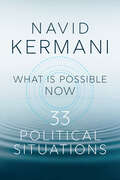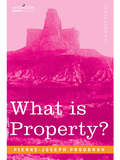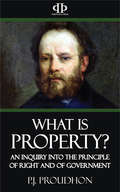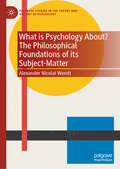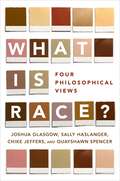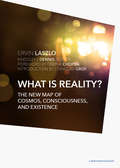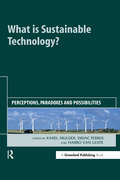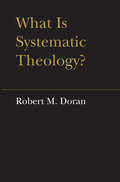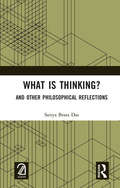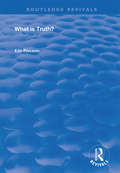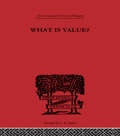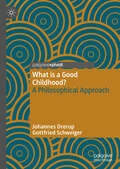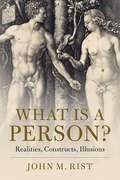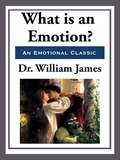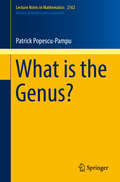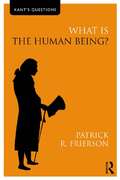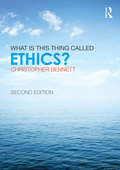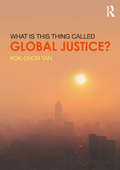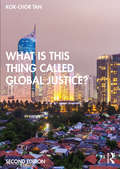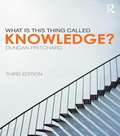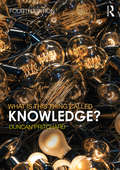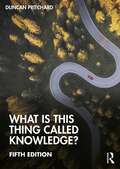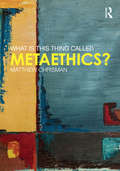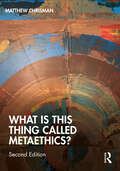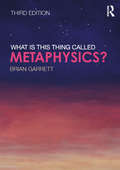- Table View
- List View
What is Possible Now: 33 Political Situations
by Navid KermaniNavid Kermani is one of the outstanding public intellectuals of his generation. Not one for drawing hard and fast conclusions, his style of thought is probing, observant, often straying from well-trodden paths and always peering beyond the present moment to trace connections and grasp the bigger picture. Well known for his prize-winning novels and major works of non-fiction, Kermani has also gained widespread acclaim as a journalist, displaying a rare political sensitivity which manages to illuminate what politicians fail to see and to seek out solutions where all appears hopeless. This volume brings together his brilliantly perceptive writing from the last thirty years, on topics ranging from terror in the Middle East to Russia’s invasion of Ukraine. As a record of Kermani’s uniquely compassionate curiosity, this absorbing book is a welcome antidote to the confusion and despair that stalks global politics today.
What is Property?
by Pierre-Joseph ProudhonProudhon's most famous declaration that "property is theft" comes from this, his most famous work, published in French in 1840; the English translation dates from 1890. According to Proudhon, only that which is being used is real property. Land must be lived on or farmed to be property, and goods must have been made by one's own labor to be owned. These new definitions challenge the very basis of capitalist systems, and Proudhon used them as the foundation for his writings in support of anarchy. Activists, historians, and philosophers will find themselves pondering his arguments long after they have finished reading.
What is Property? An Inquiry into the Principle of Right and of Government
by P. J. ProudhonIf I were asked to answer the following question: WHAT IS SLAVERY? and I should answer in one word, IT IS MURDER, my meaning would be understood at once. No extended argument would be required to show that the power to take from a man his thought, his will, his personality, is a power of life and death; and that to enslave a man is to kill him. Why, then, to this other question: WHAT IS PROPERTY! may I not likewise answer, IT IS ROBBERY, without the certainty of being misunderstood; the second proposition being no other than a transformation of the first?
What is Psychology About? The Philosophical Foundations of its Subject-Matter (Palgrave Studies in the Theory and History of Psychology)
by Alexander Nicolai WendtThis book examines the subject-matter of psychology against the background of the philosophical problem of reality. It locates the core of the issue in the dualistic conception of reality which, it argues, has left psychologists with a conceptually constrained choice of subject-matter, for instance between experience and behavior, not to mention philosophically incomplete ways of discussing its possible subject-matters. By drawing on the work of philosophers and philosophically informed psychologists, the book seeks to explain and advance the long-standing debate by introducing the under-utilized perspective of ideal-realism. The historical origins and trajectory of ideal-realism are recovered from the late 18th century through the early 20th century. The exposition of this tradition, especially in the little-known German Realpsychologie, provides theoretical psychology with a philosophically founded understanding of its subject-matter.
What is Race?: Four Philosophical Views
by Sally Haslanger Joshua Glasgow Chike Jeffers Quayshawn SpencerAcross public discourse, in the media, politics, many branches of academic inquiry, and ordinary daily interactions, we spend a lot time talking about race: race relations, racial violence, discrimination based on race, racial integration, racial progress. It is fair to say that questions about race have vexed our social life. But for all we speak about race, do we know what race is? Is it a social construct or a biological object? Is it a bankrupt holdover from a time before sophisticated scientific understanding and genetics, or can it still hold up in biological, genetic, and other types of research? Most fundamentally, is race real? In this book, four prominent philosophers and race theorists debate how best to answer these difficult questions, applying philosophical tools and the principles of social justice to cutting-edge findings from the biological and social sciences. Each presents a distinct view of race: Sally Haslanger argues that race is a socio-political reality. Chike Jeffers maintains that race is not only political but also, importantly, cultural. Quayshawn Spencer pursues the idea that race is biologically real. And Joshua Glasgow argues that either race is not real, or if it is, it must be real in a way that is neither social nor biological. Each offers an argument for their own view and then replies to the others. Woven together, the result is a lively debate that opens up numerous ways of understanding race. Above all, it is call for sophisticated and principled discussion of something that significantly permeates our lives.
What is Reality?: The New Map of Cosmos, Consciousness, and Existence
by Deepak Chopra Stanislav Grof Ervin LaszloErvin Laszlo's tour de force, What is Reality?, is the product of a half-century of deep contemplation and cutting-edge scholarship. Addressing many of the paradoxes that have confounded modern science over the years, it offers nothing less than a new paradigm of reality, one in which the cosmos is a seamless whole, informed by a single, coherent consciousness manifest in us all. Bringing together science, philosophy, and metaphysics, Laszlo takes aim at accepted wisdom, such as the dichotomies of mind and body, spirit and matter, being and nonbeing, to show how we are all part of an infinite cycle of existence unfolding in spacetime and beyond.Augmented by insightful commentary from a dozen scholars and thinkers, along with a foreword by Deepak Chopra and an introduction by Stanislav Grof, What is Reality? offers a fresh and liberating understanding of the meaning and purpose of existence.
What is Sustainable Technology?: Perceptions, Paradoxes and Possibilities
by Karel Mulder Didac Ferrer Harro van LenteDesigners of technology have a major responsibility in the current age. Their designs can have tremendous effects on society, in both the short and the long term. In fact, sustainable development itself has all the characteristics of a design project, albeit a vast one. But a failed product design here will be not just be unsuccessful in the market – it will have far-reaching consequences. It is our common responsibility to make the project successful. Technology has played an important role in creating the problems that we now face; but it will also play an important role in solving them. But this does not mean the technological fix will be easy. How do we allocate resources and attention when there are myriad issues under the umbrella of "sustainable development" currently in competition with one another? How do we arrive at precise specifications for the sustainable technologies that are to be developed and, furthermore, reach consensus on these specifications? What if our sustainable technological solutions aggravate other problems or create new ones? And, because sustainable development is all about the long-term consequences of our actions, how do we assess the effects of modifying existing landscapes, infrastructures and patterns of life?How could we be sure in advance that the changes that new technologies bring will make our society more sustainable? These dilemmas and paradoxes are the subject of this provocative book. Sometimes the claim that a technology is sustainable is made in order to make the technology acceptable in the political process, as in the case of nuclear energy production, where the claims of "sustainability" refer to the absence of CO2 emissions. In the case of biofuels, claims of sustainability have led to a "fuel or food" debate, showing that sustainability has counteracting articulations. And the well-known rebound effect is observed when increased resource efficiency can create a stimulus for consumption. What is Sustainable Technology? illustrates that the sustainability impact of a technology is often much more complicated and ambivalent than one might expect. Making improvements to existing designs is not the technological challenge that will lead to real solutions. We mustn't look to change a part of a machine, but rather the machine as a whole – or even the whole system in which it functions. It is these system innovations that have the potential to make a genuine contribution to sustainable development. What is Sustainable Technology? will help all those involved in designing more sustainable technologies in determining their strategies. It does so by presenting case studies of different technologies in contrasting contexts. Each case asks: 1. What articulations of sustainability played a role in the design process? 2. What sustainability effects did this technology lead to? 3. Who was affected, where, and when? 4. Could the designer have foreseen these consequences? 5. How did the designer anticipate them? 6. How was societal interaction dealt with during the design process? Finally, the authors reflect on future options for the sustainable technology designer. They argue that an important first step is an awareness of the multitude of sustainable development challenges that play a role in production, use, recycling and end-of-life disposal. What is Sustainable Technology? will be essential reading for product designers, engineers, material scientists and others involved in the development of sustainable technologies, as well as a wide academic audience interested in the complexities of the sustainable design process.
What is Systematic Theology?
by Robert Doran, S.J.In his classic work Method in Theology, Bernard Lonergan left many questions unanswered in regard to his treatment of systematics. In What Is Systematic Theology? Robert M. Doran attempts to articulate and respond to these questions. Doran begins by accepting four emphases presented by Lonergan concerning systematics: first, that its principal function is the hypothetical and analogical understanding of the mysteries of faith; second, that it should begin with those mysteries of faith that have received dogmatic status; third, that it must proceed in the 'order of teaching' rather than the 'order of discovery'; and last, that it must be explanatory rather than merely descriptive. He then addresses questions that are raised by each of these emphases. What Is Systematic Theology? is the most thorough attempt undertaken to date to advance Lonergan's program for systematics, fully in the spirit of his work but addressing issues that he left to others. Doran's idea of a core set of meanings for systematics – or a 'unified field structure' – is highly original, as is the integration of the systematic ideal and contemporary historical consciousness.
What is Thinking?: And Other Philosophical Reflections
by Saitya Brata DasThe philosophical essays of this collection argue, each time from a singular perspective, that the task of thinking is to release the element of the unconditional from various closures, and thus to make it manifest as the true and the essential task of our individual and social existence. Naming this unconditional element as the "messianic", the book displays the profound ethico-political significance of messianic thought for our contemporary world. Please note: Taylor & Francis does not sell or distribute the Hardback in India, Pakistan, Nepal, Bhutan, Bangladesh and Sri Lanka.
What is Truth? (Routledge Revivals)
by Edo PivcevicFirst published in 1997, this volume advances the view that the nature of truth, in so far as truth has a ‘nature’, lies in the manner of its occurrence. Edo Pivčevicì argues that truth is an vent, i.e. it does not exist until it occurs, and survives only as long as the requisite conditions for its occurrence are in place. Positing that language sets traps for the unwary, Pivčevicì states that calling ‘x’ true involves a property ascription does so only in the sense that ‘x’ enters into truth and is part of a ‘truth event’.
What is Value?: An Essay in Philosophical Analysis (International Library of Philosophy)
by Everett W. HallFirst published in 2000. Routledge is an imprint of Taylor & Francis, an informa company.
What is a Good Childhood?: A Philosophical Approach
by Johannes Drerup Gottfried SchweigerThis book deals with the question of what is a good life for children. It argues that a good childhood is one in which: a child is sufficiently provided with all the goods it needs to develop into an autonomous person a child is sufficiently provided with the goods it needs for its well-being sufficient space is given to a child´s will, wishes, concerns and projects The book not only develops a new theoretical conception of a good childhood and defends it against objections, it also engages with the problem how a good childhood can be realized in the context of families as well as the institutions of liberal states. In so doing it provides numerous insights into central themes and key issues of the philosophy of childhood. What is a Good Childhood? is essential reading for all scholars and researchers of ethics, social and political philosophy and philosophy education, especially those focusing on the philosophy of childhood.
What is a Person?: Realities, Constructs, Illusions
by John M. RistIn this book, John M. Rist offers an account of the concept of 'person' as it has developed in the West, and how it has become alien in a post-Christian culture. He begins by identifying the 'Mainline Tradition' about persons as it evolved from the time of Plato to the High Middle Ages, then turns to successive attacks on it in the seventeenth and eighteenth centuries, then proceeds to the 'Five Ways' in which the Tradition was savaged or distorted in the nineteenth century and beyond. He concludes by considering whether ideas from contemporary philosophical movements, those that combine a closer analysis of human nature with a more traditional metaphysical background may enable the Tradition to be restored. A timely book on a theme of universal significance, Rist ponders whether we persons matter, and how we have reached a position where we are not sure whether we do.
What is an Emotion?
by William JamesI should say first of all that the only emotions I propose expressly to consider here are those that have a distinct bodily expression. That there are feelings of pleasure and displeasure, of interest and excitement, bound up with mental operations, but having no obvious bodily expression for their consequence, would, I suppose, be held true by most readers. Certain arrangements of sounds, of lines, of colours are agreeable, and others the reverse, without the degree of the feeling being sufficient to quicken the pulse or breathing, or to prompt to movements of either the body or the face. Certain sequences of ideas charm us as much as others tire us. It is a real intellectual delight to get a problem solved, and a real intellectual torment to have to leave it unfinished. The first set of examples, the sounds, lines, and colours, are either bodily sensations, or the images of such. The second set seem to depend on processes in the ideational centres exclusively. Taken together, they appear to prove that there are pleasures and pains inherent in certain forms of nerve-action as such, wherever that action occur. The case of these feelings we will at present leave entirely aside, and confine our attention to the more complicated cases in which a wave of bodily disturbance of some kind accompanies the perception of the interesting sights or sounds, or the passage of the exciting train of ideas. Surprise, curiosity, rapture, fear, anger, lust, greed, and the like, become then the names of the mental states with which the person is possessed. The bodily disturbances are said to be the "manifestation" of these several emotions, their "expression" or "natural language;" and these emotions themselves, being so strongly characterized both from within and without, may be called the standard emotions. --William James
What is the Genus?
by Patrick Popescu-PampuExploring several of the evolutionary branches of the mathematical notion of genus, this book traces the idea from its prehistory in problems of integration, through algebraic curves and their associated Riemann surfaces, into algebraic surfaces, and finally into higher dimensions. Its importance in analysis, algebraic geometry, number theory and topology is emphasized through many theorems. Almost every chapter is organized around excerpts from a research paper in which a new perspective was brought on the genus or on one of the objects to which this notion applies. The author was motivated by the belief that a subject may best be understood and communicated by studying its broad lines of development, feeling the way one arrives at the definitions of its fundamental notions, and appreciating the amount of effort spent in order to explore its phenomena.
What is the Human Being? (Kant's Questions)
by Patrick R. FriersonPhilosophers, anthropologists and biologists have long puzzled over the question of human nature. It is also a question that Kant thought about deeply and returned to in many of his writings. In this lucid and wide-ranging introduction to Kant’s philosophy of human nature - which is essential for understanding his thought as a whole - Patrick R. Frierson assesses Kant’s theories and examines his critics. He begins by explaining how Kant articulates three ways of addressing the question ‘what is the human being?’: the transcendental, the empirical, and the pragmatic. He then considers some of the great theorists of human nature who wrestle with Kant’s views, such as Hegel, Marx, Darwin, Nietzsche, and Freud; contemporary thinkers such as E.O.Wilson and Daniel Dennett, who have sought biological explanations of human nature; Thomas Kuhn, Michel Foucault, and Clifford Geertz, who emphasize the diversity of human beings in different times and places; and existentialist philosophers such as Sartre and Heidegger. He argues that whilst these approaches challenge and enrich Kant’s views in significant ways, all suffer from serious weaknesses that Kant’s anthropology can address. Taking a core insight of Kant’s - that human beings are fundamentally free but finite - he argues that it is the existentialists, particularly Sartre, who are the most direct heirs of his transcendental anthropology. The final part of the book is an extremely helpful overview of the work of contemporary philosophers, particularly Christine Korsgaard and Jürgen Habermas. Patrick R. Frierson explains how these philosophers engage with questions of naturalism, historicism, and existentialism while developing Kantian conceptions of the human being. Including chapter summaries and annotated further reading, What is the Human Being? is an outstanding introduction to some fundamental aspects of Kant’s thought and a judicious assessment of leading theories of human nature. It is essential reading for all students of Kant and the philosophy of human nature, as well as those in related disciplines such as anthropology, politics and sociology.
What is this thing called Ethics?
by Christopher BennettWhat is morality? How do we define what is right and wrong? How does moral theory help us deal with ethical issues in the world around us? This second edition provides an engaging and stimulating introduction to philosophical thinking about morality. Christopher Bennett provides the reader with accessible examples of contemporary and relevant ethical problems, before looking at the main theoretical approaches and key philosophers associated with them. Topics covered include: life and death issues such as abortion and global poverty; the meaning of life; whether life is sacred and which lives matter; major moral theories such as utilitarianism, Kantian ethics and virtue ethics; critiques of morality from Marx and Nietzsche. What is this Thing Called Ethics? has been thoroughly revised and updated throughout, with a new final chapter on meta-ethics. With boxed case studies, discussion questions and further reading included within each chapter this textbook is the ideal introduction to ethics for philosophy students coming to the subject for the first time.
What is this thing called Global Justice?
by Kok-Chor TanWhat is this thing called Global Justice? explores the core topics covered on the increasingly popular undergraduate modules on global justice including: world poverty economic inequality nationalism human rights humanitarian intervention immigration global democracy and governance climate change international justice. Centered on real world problems, this textbook helps students to understand that global justice is not only a field of philosophical inquiry but also of practical importance. Each chapter concludes with a helpful summary of the main ideas discussed, study questions and a further reading guide.
What is this thing called Global Justice?
by Kok-Chor TanWhat is this thing called Global Justice? is a clear and engaging introduction to this widely studied and important topic. It explores the fundamental concepts, issues and arguments at the heart of global justice, including: world poverty economic inequality nationalism human rights humanitarian intervention immigration global democracy and governance climate change reparations health justice international justice. This second edition has been updated throughout and includes two new chapters: on ethical and moral debates concerning reparations and on global health justice. The chapters on world poverty, human rights, just war, borders, climate justice, and global democracy have also been substantially revised and updated. Centered on real world problems, this textbook helps students to understand that global justice is not only a field of philosophical inquiry but also of practical importance. Each chapter concludes with a helpful summary of the main ideas discussed, study questions and a further reading guide.
What is this thing called Knowledge?
by Duncan PritchardWhat is knowledge? Where does it come from? What kinds of knowledge are there? Can we know anything at all? This lucid and engaging introduction grapples with these central questions in the theory of knowledge, offering a clear, non-partisan view of the main themes of epistemology. Both traditional issues and contemporary ideas are discussed in sixteen easily digestible chapters, each of which conclude with a useful summary of the main ideas discussed, study questions, annotated further reading and a guide to internet resources. Each chapter also features text boxes providing bite-sized summaries of key concepts and major philosophers, and clear and interesting examples are used throughout. The book concludes with an annotated guide to general introductions to epistemology, a glossary of key terms, and a summary of the main examples used in epistemology, This an ideal first textbook in the theory of knowledge for undergraduates coming to philosophy for the first time. The third edition has been revised and updated throughout and features two new chapters, on religious knowledge and scientific knowledge, as part of a whole new section on what kinds of knowledge there are. In addition, the text as a whole has been refreshed to keep it up to date with current developments.
What is this thing called Knowledge?
by Duncan PritchardWhat is knowledge? Where does it come from? What kinds of knowledge are there? Can we know anything at all? What is the practical relevance of learning about epistemology? This lucid and engaging introduction grapples with these central questions in the theory of knowledge, offering a clear, non-partisan view of the main themes of epistemology. Both traditional issues and contemporary ideas are discussed in twenty easily digestible chapters, each of which conclude with a useful summary of the main ideas discussed, study questions, annotated further reading and a guide to internet resources. Each chapter also features text boxes providing bite-sized summaries of key concepts and major philosophers, and clear and interesting examples are used throughout. The book concludes with an annotated guide to general introductions to epistemology, a glossary of key terms, and a summary of the main examples used in epistemology. This an ideal first textbook in the theory of knowledge for undergraduates coming to philosophy for the first time. The fourth edition has been revised and updated throughout and features four new chapters on applied epistemology, covering the relationship between the theory of knowledge and technology, education, law, and politics. In addition, the text as a whole has been refreshed to keep it up to date with current developments.
What is this thing called Knowledge?
by Duncan PritchardWhat is knowledge? Where does it come from? What kinds of knowledge are there? Can we know anything at all? What is the practical relevance of learning about epistemology? This lucid and engaging introduction grapples with these central questions in the theory of knowledge, offering a clear, non-partisan view of the main themes of epistemology. Both traditional issues and contemporary ideas are discussed in 22 easily digestible chapters, each of which concludes with a useful summary of the main ideas discussed, study questions, annotated further reading, and a guide to internet resources. Each chapter also features text boxes providing bite-sized summaries of key concepts and major philosophers, and clear and interesting examples are used throughout. The book concludes with an annotated guide to general introductions to epistemology, a glossary of key terms, and a summary of the main examples used in epistemology. This is an ideal first textbook in the theory of knowledge for undergraduates coming to philosophy for the first time. This fifth edition has been revised throughout and features a new part devoted to social epistemology. In addition, the text as a whole has been refreshed to keep it up-to-date with current developments.
What is this thing called Metaethics?
by Matthew ChrismanAre moral standards relative to cultures? Are there any moral facts? What is goodness? If there are moral facts how do we learn about them? These are all questions in metaethics, the branch of ethics that investigates the status of morality, the nature of ethical facts, and the meaning of ethical statements. To the uninitiated it can appear abstract and far removed from its two more concrete cousins, ethical theory and applied ethics, yet it is one of the fastest-growing and most exciting areas of ethics. What is this thing called Metaethics? demystifies this important subject and is ideal for students coming to it for the first time. Beginning with a brief historical overview of metaethics and the development of a "conceptual toolkit," Matthew Chrisman introduces and assesses the following key topics: • ethical reality: including questions about naturalism and non-naturalism, moral facts, and the distinction between realism and antirealism • ethical language: does language represent reality? What mental states are expressed by moral statements? • ethical psychology: the Humean theory of motivation and the connection between moral judgement and motivation • ethical knowledge: intuitionist and coherentist moral epistemologies, and theories of objectivity and relativism in metaethics • new directions in metaethics, including non-traditional theories and extensions to metaepistemology and metanormative theory. Additional features such as chapter summaries, questions of understanding, and a glossary make this an ideal introduction to metaethics.
What is this thing called Metaethics?
by Matthew ChrismanWhat makes something morally right? Where do our ethical standards come from? Are they relative to cultures or timeless and universal? Are there any objective moral facts? What is goodness? If there are moral facts, how do we learn about them? What do we mean when we say someone ought to do something? These are all questions in metaethics, the branch of ethics that investigates the status of morality, the nature of ethical value, the possibility of ethical knowledge, and the meaning of ethical statements. To the uninitiated it can appear abstract and far removed from its two more concrete cousins, ethical theory and applied ethics, yet it is one of the fastest-growing and most exciting areas of ethics. What is this thing called Metaethics? demystifies this important subject and is ideal for students coming to it for the first time. Beginning with a brief overview of metaethics and the development of a "conceptual toolkit," Matthew Chrisman introduces and assesses the following key topics: ethical reality: including questions about naturalism and non-naturalism, moral facts, and the distinction between realism and antirealism ethical language: does language represent reality? What mental states are expressed by moral statements? moral psychology: the theory of motivation and the connection between moral judgement and motivation moral knowledge: intuitionist and coherentist moral epistemologies, and theories of objectivity and relativism in metaethics prominent metaethical theories: naturalism, nonnaturalism, error-theory, and expressivism new directions in metaethics, including non-traditional theories, thick ethical concepts, and extensions to metaepistemology and metanormative theory. The Second Edition has been completely revised and updated throughout. This includes a new thematic organization of the core chapters, many new examples, a newly written final chapter including discussion of thick ethical concepts and all-things-considered normativity, updated references to recent scholarly literature, improved learning resources, an expanded glossary of terms, and much more. Additional features such as chapter summaries, questions of understanding, and suggestions for further reading make What is this thing called Metaethics? an ideal introduction to metaethics.
What is this thing called Metaphysics?
by Brian GarrettHow did our universe come to be? Does God exist? Does time flow? What are we? Do we have free will? What is truth? Metaphysics is concerned with the nature of ourselves and the world around us. This clear and accessible introduction covers the central topics in metaphysics in a concise but comprehensive way. Brian Garrett discusses the crucial concepts and arguments of metaphysics in a highly readable manner. He addresses the following key areas of metaphysics: • God • Existence • Modality • Universals and particulars • Facts • Causation • Time • Puzzles of material constitution • Free will & determinism • Fatalism • Personal identity • Truth This third edition has been thoroughly revised. Most chapters include new and updated material, and there are now two chapters devoted to attacks on free will and fatalism. What is this thing called Metaphysics? contains many helpful student-friendly features, such as a glossary of important terms, study questions, annotated further reading, and a guide to web resources. Text boxes provide bite-sized summaries of key concepts and major philosophers, and clear and interesting examples are used throughout.
